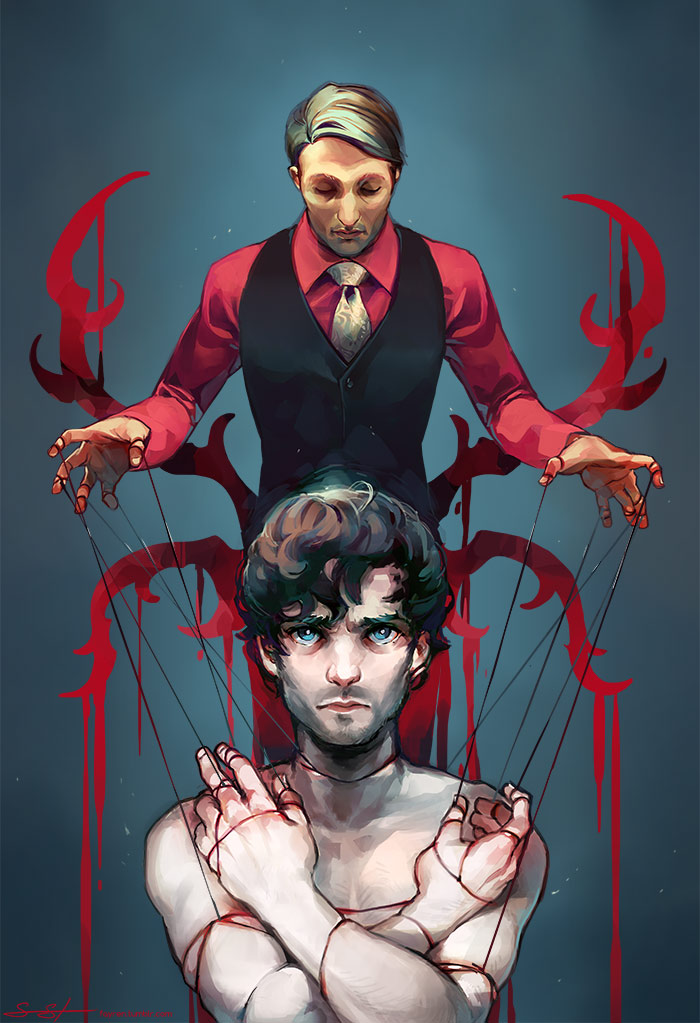Smash the Shelves
I argued “Literary Fiction” is a meaningless term used only by snobs, and every book labelled as such can easily be placed in a genre. It follows that the opposite term, “genre fiction”, is equally meaningless, since all fiction can be put in genres. Then I argued the obsession with shelving books into finely grained genres is a throwback. A few more notes on the categorisation of fiction before we move on.
 |
|---|
| Hannibal fan art by fayrenpickpocket |
I’m suspicious of the term “speculative fiction”. No one knows what is inside another person’s mind, so every work of fiction is speculative, but usually the term is used if any of the characters have pointed ears.
The Silence of the Lambs film (1991), based on the 1988 novel by Thomas Harris, is played straight with action and mystery. The characters have extreme mental pathologies but are otherwise human. Having a top stage actor with impeccable manners instead of an ugly madman with a chainsaw was enough of a twist to win five Oscars.
I read Thomas Harris’ next book Hannibal when it came out in 1999, a while ago, but I don’t remember many fantastical elements. I caught a few episodes of the TV Hannibal, and loved how, as Will Graham descended into Lector’s psychopathy, he found a metaphysical spooky world. I guess I could accept that the television adaption of the Thomas Harris Hannibal stories is more “speculative” than the books and movies.
Horror can be fantasy or more mundane. It can play with reader expectations and start with a supernatural monster that is shown, Scooby-Doo style, to be a mundane human threat. Conversely, it can start realistically, then expand into a hidden world of ghosts, aliens or fae. Every story needs at least a little fear to drive the plot. Putting the protagonist into a risky situation is the hallmark of a novel. Therefore, all good stories are horror stories with different amounts of padding.
 |
|---|
| Cendrea by David Revoy |
The term “epic fantasy” is often used to say the story is set in an alternative world, not within a recognised historical earth setting. However, often that alternative world is connected to our world through a magical wardrobe, a time machine that looks like a police box, platform 9¾ and so on. So where do you draw the line?
I have yet to play the Assassin’s Creed computer game but I read one of the Oliver Bowden spin-off novels and I enjoyed the underrated film. It layers medieval fantasy, modern urban fantasy, sci-fi and historical fiction. A cross between the Da Vinci Code and James Bond. What genre is that? Who knows, and it doesn’t matter. I love it when an author breaks the rules and prevailing fashions.
Many years ago, there was pulp fantasy and sci-fi sold in a supermarket rack for a £1 and a £40 hardback edition of Lord of the Rings. Today, you can find paperback Lord of the Rings or Song of Ice and Fire for £1 in discount book stores. With ebooks, everything from the big four publishers to an indie working alone share the same phone screen. Format aside, the purported genre split between “Sword and Sorcery” and “High Fantasy” is that the former deal with “personal battles” and the latter are concerned with “world-endangering matters”. That’s bunk. Conan and The Witcher are Sword and Sorcery characters, but their own quests to make a dime lead up to existential power struggles with the high and mighty. The trope is old: Arthur swashbuckles around for a while, then becomes the King of Camelot.
Writers claim, for marketing reasons, to be a “Amazon number one bestselling author”, when they sold four books in an obscure sub-category. I’m sure one day that I’ll join them in that wheeze. But are there readers who decide to read “Science Fiction: Colonisation: Galactic Empire Science Fiction: Adult Space Hybrid Relationship” for the rest of their lives? Maybe there are. It’s better than not reading at all. When authors mix up genre conventions, when an ancient legionary finds an Apollo lander, I don’t want the surprise to be ruined because the book was shelved under “Romans in Space”. Maybe it’s just because I am not a joiner, but for me, to pigeonhole a book is to kill its soul.
But what do you think? Tell me at the Twitter thread, or the Facebook thread.